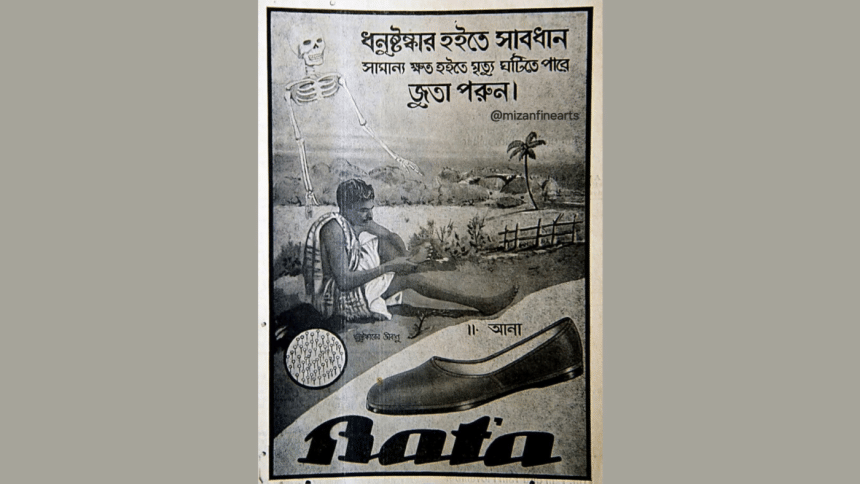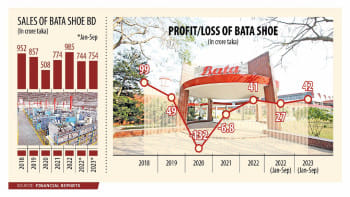The Legacy of Thomas Bata in Bengal

Whenever Bata shoes come to mind, we are reminded not only of how footwear became woven into the fabric of everyday life—evolving with shifting lifestyles and consumer needs—but also of an extraordinary figure linked to its history in Bangladesh: William A.S. Ouderland. A Dutch national and then Production Manager of the Bata Shoe Company in Dhaka, Ouderland remains the only foreigner to be awarded the state honour of 'Bir Pratik' for his brave and active role in the 1971 Liberation War.
Bata was instrumental in transforming footwear from a luxury into a necessity, making shoes both affordable and widely available without compromising on quality—a critical contribution during decades when much of the population lived with limited means, particularly before the turn of the century. From its beginnings as a global enterprise to its deep-rooted presence in colonial Bengal and present-day Bangladesh, Bata steadily became a familiar and trusted name, almost indistinguishable from local brands. At the heart of this transformation was the vision of its founder, Thomas Bata (1876–1932), who visited Bengal shortly before his death.

Although Bata Shoe began formal operations in East Pakistan in 1962—nearly a decade before the independence of Bangladesh—Thomas Bata's visit to Bengal marked an early turning point for the region's shoe industry, which was still in its infancy. Before his visit, Bata's presence in the region began with shoe imports managed by local dealers around 1925. Over time, the brand transitioned to local production, establishing an exclusive industrial township in Konnagar, in the Howrah district of West Bengal in 1933, which later became known as Batanagar.
Interestingly, Thomas Bata's autobiographical book How I Began found a remarkable afterlife in Bengal when it was translated into Bengali by the acclaimed novelist Bibhutibhushan Bandyopadhyay and published in 1943. The original text, written in Czech, had been translated into English a year earlier by Jab Baros and brought out in 1942 by the Club for Graduates of the Bata School in Batanagar, Calcutta.
The Bengali edition included an introduction by the eminent scientist P.C. Ray, further reinforcing Bata's legacy within Bengal's cultural and intellectual milieu. The book presents a rich compilation of Bata's reflections, manifestoes, and speeches, offering valuable insights into his vision and philosophy.

P.C. Ray was not only an eminent chemist and scientist but also a pioneering entrepreneur who played a vital role in encouraging the people of Bengal—long accustomed to salaried employment—to pursue business and industrial ventures. Under colonial rule, the scope for such salaried jobs had further diminished due to limited industrialisation. Ray was not merely a vocal advocate for industrial development; the founding of The Bengal Chemical and Pharmaceutical Works stands as a testament to his practical commitment to this vision. It is therefore not surprising that he took a keen interest in Thomas Bata's autobiography. In his introduction, Ray remarked that it was essential for people in Bengal to learn about Bata, as the region had long been stifled by a lack of industrial effort.
He interestingly noted that although Thomas Bata might have been relatively unknown in Bengal, his products were already well recognised—highlighting how deeply Bata had penetrated the shoe market during the final decade of colonial rule. P.C. Ray deeply admired Bata's vision. Though Bata was a prominent industrialist, he rejected a lavish lifestyle and was not driven solely by profit. Ray appreciated Bata's emphasis on making each production unit self-reliant, a model he believed was essential for Bengal as well. Given that much of Bengal's industry was based on small-scale home crafts, Ray recognised that without such structural changes, it would struggle to compete with large-scale mechanised production.
Thomas Bata was born into a devout Christian family in what was then Czechoslovakia. His father was also a shoemaker, and Thomas inherited both the trade and a strong entrepreneurial spirit. However, it was Thomas Bata himself who transformed the family's modest handmade shoemaking business into a global enterprise. Despite facing challenges such as wars, economic depressions, and global instability, he expanded the company into a multinational brand—driven by his own vision, strategy, and worldview.

As a child, Thomas aspired to be well-educated and to join the ranks of the established middle class, but the path was far from easy. Limited access to education and his family's modest economic condition made upward mobility particularly difficult—especially in a Europe where such advancement was traditionally hard-won. In 1894, he broke away from his father's enterprise to start an independent shoe business of his own, a venture that was equally challenging in its early days.
Even in his early years, Thomas became acutely aware of the harsh realities of the capitalist system, which drained the life out of workers. He first encountered a shoe-making machine in Frankfurt but was unable to implement it in his own business due to a lack of capital at the time. His socialist views began to take shape early on, influenced by the works of Tolstoy and by witnessing a society ruled by a few lazy individuals while workers toiled relentlessly, living in poverty. He was deeply moved by Tolstoy's portrayal of ordinary life, which profoundly shaped his worldview and remained a core influence throughout his life. Thus, he never wanted to be a greedy capitalist.
In 1904, Thomas Bata was finally able to introduce machinery into his shoe factory. His visit to the United States further impressed him, as he observed that people there were not concerned with their past origins or family prestige. Instead, they focused on working hard in the present to make money and build relationships based on current achievements. During World War I, he secured substantial orders to supply shoes for the military, which helped sustain his business and support his workforce. Due to his sharp insights, keen observations, and strategic decisions, Bata's company not only survived the economic depression that followed the war but also expanded significantly worldwide. His autobiography reflects the experiences and lessons he gained over the years, offering valuable insight into his journey and the growth of his business.

In Bangladesh, Bata has become a trusted name in footwear, operating two major factories and enjoying a presence akin to a local brand. Alongside it, several foreign and emerging domestic brands contribute to a growing industry. As the country looks to diversify beyond its garment exports, experts see strong potential in footwear. Like in the RMG sector, global brands such as Nike and Adidas outsource production to countries like Bangladesh. With proper support and direction, Bangladesh could become a key player in global shoe exports—carrying forward the legacy of accessible, quality footwear that Thomas Bata once championed.
Priyam Paul is a researcher and journalist.

 For all latest news, follow The Daily Star's Google News channel.
For all latest news, follow The Daily Star's Google News channel. 










Comments